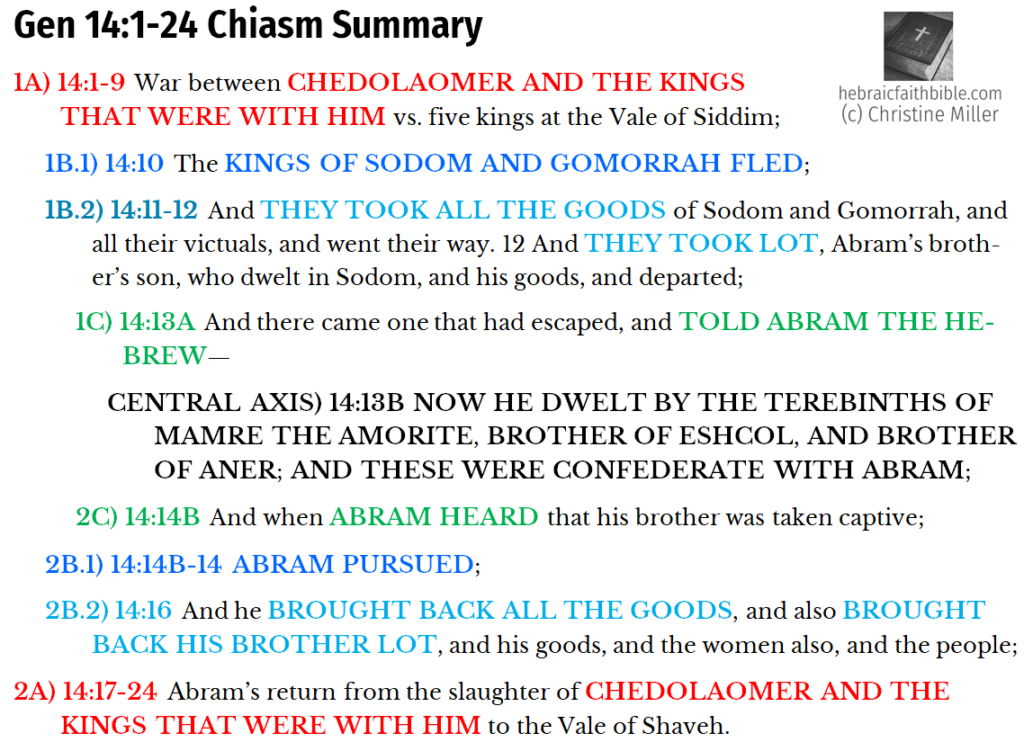Read Genesis 14:1-24 at Bible Gateway.
The teaching tools of scripture
Gen 1:1-2:3 and the teaching tools of scripture part one and part two
Gen 1:1-6:8 and finding the topic themes of scripture
Hebrew paragraph divisions
14:1-24 {s} Signs of Messiah: Victory over death, Melchizedek, bread and wine
Strong themes of the parashah
None this week.
Gen 14:1-24 chiastic structure
Download the fully expanded Gen 14:1-24 Triennial Amraphel chiasm pdf (Coming …).
Theme of the parashah
Signs of Messiah (victory over death, Melchizedek, bread and wine).
Finding Messiah in Torah
And Melchizedek king of Salem brought forth bread and wine, and he was the priest of the most high God. And he blessed him, and said, “Blessed be Abram of the most high God, possessor of heaven and earth, and blessed be the most high God, who has delivered your enemies into your hand.” And he gave him tithes of all. Gen 14:18-20
The name “Melchizedek” in Hebrew is a contraction of two words; melech, meaning king, and tsedek, meaning righteousness. This is why the writer of Hebrews says that Melchizedek was both the king of peace (Salem or shalom) and the king of righteousness.
For this Melchizedek, king of Salem, priest of the most high God, who met Abraham returning from the slaughter of the kings, and blessed him; to whom also Abraham gave a tenth part of all; first being by interpretation king of righteousness, and after that also king of Salem, which is, King of peace; without father, without mother, without descent, having neither beginning of days, nor end of life; but made like unto the Son of God; abides [as] a priest continually. Heb 7:1-3
We learn that Melchizedek was king, priest, and prophet, since prophets speak on God’s behalf to men, as he spoke to Abram. Hebrews explains that Melchizedek was a preincarnate appearance of Yeshua our Lord, the Promised Seed, who also serves in the triple offices of king, priest, and prophet. Abram’s meeting with Melchizedek/ Messiah includes the first appearance in Scripture of tithes, and bread and wine, symbols Yeshua instituted as remembrances of His sacrifice of body and blood for our sakes.
And He took the cup, and gave thanks, and said, “Take this, and divide it among yourselves: for I say unto you, I will not drink of the fruit of the vine, until the kingdom of God shall come.” And He took bread, and gave thanks, and broke it, and gave unto them, saying, “This is My body which is given for you: this do in remembrance of Me.” Likewise also the cup after supper, saying, “This cup is the new covenant in My blood, which is shed for you.” Luk 22:17-20
Additional readings for this parashah
Isa 41:2-14; 1 Kin 10:9 | Psa 10 | Heb 7:1-19
Studies in Triennial Amraphel
Gen 13 and 14, Abram’s faith in the promise tested
Gen 13:18-14:24, Chiastic Structure
Gen 14:1-24, History of ancient kings
Further study off site
Giants in the Old Testament – Answers in Genesis
Did Chedorlaomer and the other kings really exist? – Christian Answers
The Authenticity of the Book of Genesis – Bill Cooper
Abram’s 318 men – Biblical Horizons
I love Biblical Horizons and Biblical Chronology newsletter. They respect the accuracy and authority of Scripture, and they answer puzzles that geeks like me like to puzzle over, LOL.
Helpful commentary on Gen 12:1-17:27 – Restoration of Torah
SCRIPTURE REVEALED SERIES by CHRISTINE MILLER:
THE LAW of LOVE | FINDING MESSIAH in TORAH | GENESIS in CHIASTIC STRUCTURE


















Leave a Reply